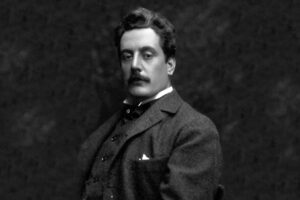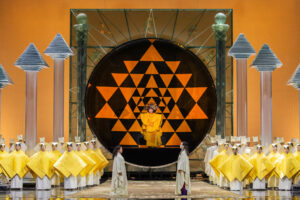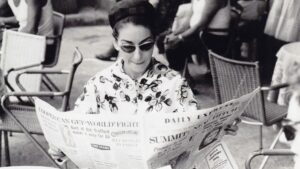

A meeting between two such persons must prove combustible – in one source of the opera, Hawthorne’s “Rappaccini’s Daughter,” the lethal lady drinks a “universal antidote” and dies (a proper Puritan punishment for her father’s sacrilegious experiments); in Richard Garnett’s “The Poison Maid,” the girl is intended to captivate the son of her father’s old enemy, the king; the boy swoons from her kiss – because he’s fallen in love. He’s been raised on antidotes! Happy ending. Garnett was of an ironic humor, as was Vaughan Williams – but alas, Garnett did not write the libretto.
In the operatic conflation by a folklorist named Evelyn Sharp, who had neither experience nor talent, Poison Girl’s father, a wizard, has raised her on snake venom to exact revenge on the son of the Empress, who disdained the low-born wizard twenty years before, but she’s a witch who has raised her son on antidotes for no particular reason. (But why not?) The boy wants to kiss; the girl doesn’t (lest she kill him). But she gives in. The opera ends with everyone married – six couples, impossible to differentiate. Gilbert would have told this tale wittily, and held it together, perhaps with a plot about the perils of scientific experimentation (at least on one’s children), and Sullivan would have made elegant musical sense of the progression of events. But Vaughan Williams, who was inspired by G&S and also by The Magic Flute, is way out of his league.
Hugh the Drover gets a hearing now and then; Pilgrim’s Progress is of mostly choral appeal; Sir John in Love is weak tea compared with the Falstaffs of Verdi, Nicolai or Salieri – nothing suggests the composer had any great gift for the operatic form. The music is attractive, in a foursquare bluff and British way, the work of a man determined, come what may, to ignore any contemporary musical developments in Germany or France, so that, like most of his music, the score sounds forty years older than it is (premiere, 1936). This is not a problem today, of course.
The orchestration is elaborate, inventive and often delicious, and there are many pretty tunes, but they seldom function the way music should in an opera: Too much backstory that might be sung, or somehow urged into musical form, is spoken in tedious rhymed dialogue instead. Motivations are all over the place. (Fairy tales don’t move us unless there is some credible psychology at work: Pamina torn between love and her demanding mother; Hansel and Gretel hungry and afraid of the dark; Strephon wary of telling Phyllis that he’s half-fairy.) In Kiss, people fall in love because their voices suit, at first sight or even sooner – they haven’t enough personality to make feelings relevant. Yes, that happens in Magic Flute and Oberon, too, but Mozart and Weber were theatrical fellows who could provide psychological depth; Vaughan Williams’s charming score may stand comparison with theirs (near as one could guess from one hearing), but not his musical storytelling.
There is “magical” music for assorted spells, and “exotic” music for three Gypsy mediums (media?), and three mischievous (we have to take their word for it) hobgoblins (named Lob, Hob and Gob – yes, that’s the level of the humor, panto without the naughty bits), but the “exotic” touches sound like Hollywood or J. Arthur Rank when dancing girls in gauze appear on an Arabian Nights soundstage. After quarreling with his librettist (I wonder why), Vaughan Williams tinkered with the piece on his own for twenty years in off hours from writing his last four great symphonies, so there was something here that he loved very much. Can’t guess what it was.
The Bronx Opera has been in existence now for forty-five years, in good times and in bad. This can’t have been easy. I can remember some excellent, even triumphant occasions, sometimes up in the Bronx, more often at their regular second weekend outings at the Kaye Playhouse at Hunter College, but the best were many years ago. In recent seasons the company seems to have lost its way. The translated libretti have been excruciating, the productions clumsy and style-free, the singers amateurish.
Set against the recent past, The Poisoned Kiss was something of a triumph. For one thing, the libretto, witless as it is, at least was not translated. (Still, it made me sorry for every unkind thing I’d said about Jeremy Sams’ work on The Enchanted Island.) The orchestra under Michael Spierman, the company’s artistic director, often played beautifully, making a good case for the tuneful score. (The oboes, especially, deserve commendation.)
The singers on the second Saturday (January 21st) were a capable lot; some may have a future beyond the Bronx. Hannah Rosenbaum, a soprano of Dumontian avoirdupois, sang Tormentilla (librettist Sharp had no gift for clever names) with a sweet, true soprano of a English-horn-like quality that fell most gratefully on the ear. Her arias were pleasing and her duet with Cabiria Jacobsen (as her maid) would surely have been encored in an earlier era. I thought her voice small until the final ensemble, when she could be heard clearly, with no loss of quality, above a large chorus and the dozen other principals. Leslie Swanson played the Empress in the manner of Maggie Smith, but Maggie sings better. Elizabeth Perryman, Juli Borst and Jodi Karem sang a succulent trio of media (mediums?).
Kirk Dougherty, who has a pleasant, grainy tenor, was not put to much strain by the role of the walking Antidote, here Prince Amaryllus (I warned you about the names). Richard Bozic played Dipsacus (what is that?), Tormentilla’s father, whose lust for revenge supposedly drives the story – but he says so in dialogue, Vaughan Williams missing the chance to show us what a maniacal baritone can do. Too bad – his few chances to sing implied Bozic might have been up to it. Gilad Paz, Nicholas Provenzale and Robert C. Joubert were entertaining as the hobgoblins – what were they doing in the story again? Well, they cut capers and sang a lot. (Three Papagenos are not better than one.) There were credits for stage direction, costumes and set design, but they didn’t even sing and one had the impression costume was pretty much left to the performers.
I’m delighted there are still shoestring companies in New York doing lost repertory and reviving forgotten treasures. The Poisoned Kiss reminds us that Vaughan Williams’s orchestral music, if not his operatic output, deserves more attention than it currently receives. It’s clear why the Bronx Opera, knowing this score, thought something could and should be made of it, and musically they put the case with admirable care.

























Comments